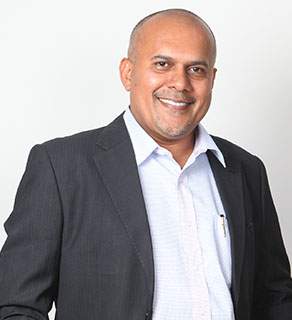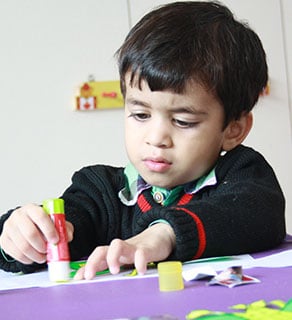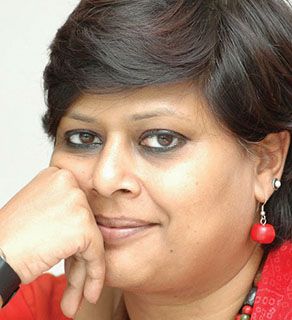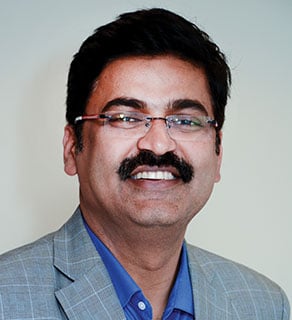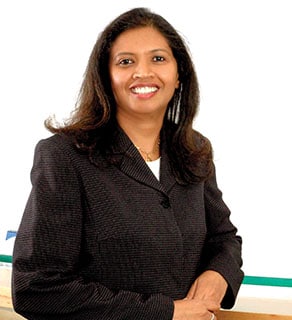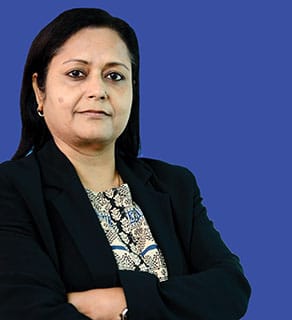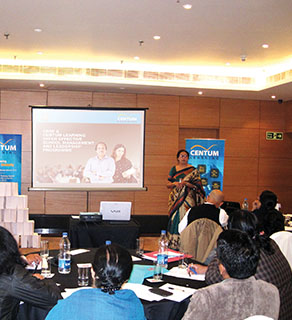Preschool is one of the most lucrative segments of the Indian education market and is flourishing, unfortunately, sans regulation. Stakeholders are almost unanimous in calling for proper guidelines and procedures to regulate this segment. Nidhi Sharma of ENN reads the tea leaves
 Jaya, Ekta and Abha (names changed) were housewives in the middle class locality of Mayur Vihar in East Delhi till a few years ago. Not any more. The trio is laughing their way to the bank every month. There are no bounds to their joy. The reason for their joy? The three of them have started preschools for tiny tots in DDA flats at their ground floor residence, with the verandah converted into a playground. Interestingly, the three schools started by these new enterpreneuers are closely located within 200 meters of each other!
Jaya, Ekta and Abha (names changed) were housewives in the middle class locality of Mayur Vihar in East Delhi till a few years ago. Not any more. The trio is laughing their way to the bank every month. There are no bounds to their joy. The reason for their joy? The three of them have started preschools for tiny tots in DDA flats at their ground floor residence, with the verandah converted into a playground. Interestingly, the three schools started by these new enterpreneuers are closely located within 200 meters of each other!
This phenomenon is not limited to Mayur Vihar or Delhi. Preschools continue to mushroom across the metros, tier II and tier III cities. It can also be started in the house one lives and can manage to keep clean and decorated. The factors driving such an unprecedented growth can be attributed to rapid urbanisation, parents’ rising aspirations for quality education (English Convent education), improved affordability and more women joining the workforce.
For the uninitiated, preschools are a part of the non-formal education system. Emerging as a lucrative business for everybody, it is known by various names such as creche, nursery, kindergarten, home-based child care system, preparatory schools and nursery schools. The age for admission to these schools typically ranges between two and six years – the most crucial stage of for a child’s development.
Regardless of its spread and rising demand, the preschool sector operates without any formal guidelines. This means there are no rules on minimum age for admission, teacher-child ratio, curriculum, trained staff, sanitation and safety and security measures. As a consequence, monitoring of these schools has become difficult. This has placed the kids at the receiving end with maltreatment and even sexual assault.
Sample the following:
January 2014: Srinivas, 25, a bus driver at a preschool in Bangalore was arrested for allegedly sexually assaulting a two-and-a-half year old girl.
September 2014: A two-and-a-half year old child was repeatedly abused by Amit Kumar (22), a security guard-cum-help, who looked after the children in the absence of women staff at a playschool in Rohini, New Delhi.
October 2014: A 3-year old nursery student was allegedly sexually abused by office assistant Gundappa, 45, inside her class in Bangalore.
Low entry barriers, minimal investment and absence of regulations to oversee the preschool segment have attracted huge interest in this segment. No prior permission or licensing is needed and there is full freedom for promoters to design and develop learning programmes.
The preschool business operates in both the unorganised sector and by corporate. Some of the big businesses in India include Tree House, Bachpan, Euro Kids, Shemrock, Kangaroo Kids, Podar Jumbo Kids, Jumbo, Little Millenium, Apple Kids, Time Kids etc.
According to a Crisil research report, the preschool business is expected to touch Rs. 13,300 crore by 2015-16, out of which branded preschools are expected to contribute about Rs 4,500 crore. Similarly, another report estimates that the number of preschools in India will reach the 33,000 mark by the end of 2015, reporting a growth of 26 per cent annually.
 Key Risks
Key Risks
• Increasing incidents of child abuse
• Exhorbitant fees
• No prior permission or licensing required to start these schools
• Quality of education or activities varies from institute to institute
• Curriculum needs to be streamlined
• Maintaining a proper teacher-child ratio, engagement of trained staff
Yet, the preschool industry is in its nascent stage in India with around 1.1 per cent enrolment as compared to France or Scotland where enrolment is 100 per cent.
According to leading research firm Gyan Research and Analytics Pvt. Ltd., the organised sector comprises 17 per cent of the industry, with the penetration rate expected to rise to 25 per cent by 2015, due to the rapid growth of preschools in Tier-III and Tier-IV cities. In this background, exercising any control over the preschools for quality assessment to regulate the standards of preschool education is a huge challenge.
Time and again, whenever stories of sexual assult are flashed by 24X7 electronic media, it manges to momentarily stir the nation’s collective conscience. Stakeholders equally voice their concern for the need for formulating guidelines focusing on minimum age for admission, teacher-child ratio, curriculum, trained staff, safety and security measures and monitoring of these schools. At all other times, it is seldom taken seriously.
Experts also estimate that the organised sector comprises 17 per cent of the industry, with the penetration rate expected to rise to 25 per cent by 2015, due to the rapid growth of preschools in Tier-III and Tier-IV cities. In this background, exercising any control over preschools for quality assessment to regulate the standards of preschool education is a huge challenge.
Of course, regulation is needed but it should not create Inspector raj and an avenue for extra income for those monitoring the sector. Raman Bajaj, Managing Director – Educomp Childcare Pvt. Ltd says, “Regulation is not necessarily a bad thing, but what we need is correct, meaningful and easily implementable regulation”.
“Regulations should not act as a disincentive…” he adds.
A S Ganesh, Founder & Managing Director, SMARTKiDZ Educare India Pvt Ltd. also believes that preschools should be regulated. “Running a preschool business in India provides the freedom to design and adapt the curriculum and has resulted in a lot of variation in the learning programmes.”
However, Ganesh acknowledges, there has been no system designed to measure the quality and output of the education programmes that have been designed for these tiny tots. Similarly, there are no parameters for the admission criteria for these schools. Thus, kids enter schools from various socio-economic backgrounds, study in varied education patterns and enter primary schools with a variation in knowledge and understanding.”
Parameters that measure the efficiency and effectiveness of the early education imparted in preschools should be in place, he argues. “This quality assessment helps safeguard early education and helps in regulating the standards of preschool education. By doing so, the unbranded schools which follow little or no norms will be stopped, he says.”
Even as educators debate over what should govern the preschool business-government regulations or peer assessment or self-governance, the business of preschools will only grow in coming years. Vittal Bhandary, Managing Director, Learning Edge India, has a different take on the issue of regulation. “Branded preschools have their own way of regulating safety, hygiene, sanitation, curriculum delivery and teachers training. These are part of our policies and we have a robust team to audit this from time to time,” he says. His fear is somewhat different. “The moment these regulations go to a government body, it can lead to a lot of corruption,” he argues.
To say that the preschool market in India is flourishing and rapidly expanding would be to stress the obvious. Fuelled by increased investments by existing companies and expansion into smaller towns and cities of India, the preschool segment is expected to generate revenues of US $3.24 billion by 2017. No wonder, several global preschool chains are eyeing business opportunities in the country. Latest in the list is UK-based Modern Montessori International (MMI) Group which is in plans to expand its reach in India by doubling preschool teacher training centres and franchisees for running kindergarten classes through major corporations. Having first forayed into the Indian market in early 2003, the group estimates a demand for 1,00,000 such educationists over the next 10 years.
Even as preschool businesses helps its owners and franchisee owners fulfil their own entrepreneurial aspirations, achieve higher profits every year, it would serve all the stakeholders better if the sector is regulated.
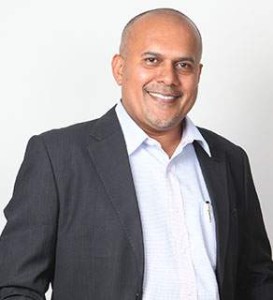 What are the current trends in the preschool business in India?
What are the current trends in the preschool business in India?








